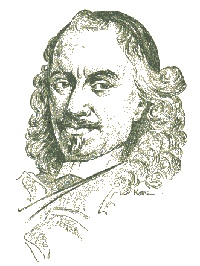The directory «Plots»
Corneille Pierre
(1606–1684)

Pierre Corneille, along with his contemporary and rival, Jean Racine, ranks as France's greatest classical tragic dramatist. Born in Rouen, he was educated by Jesuits, studied law, entered the Rouen parlement in 1629 (the year his first play was written), and was a member of that judicial body for 21 years. That he actually produced 20 plays while a member of parlement , and 12 afterward, is an indication of both his energy and his vitality.
Although Corneille is regarded as the founder of French tragedy, six of his first eight plays, beginning with Melite (c.1629), were comedies. In each, however, he was working toward the creation of the Cornelian hero. In La Place Royale (1633-34) his comedy does not exclude seriousness. The hero abandons his proposed wife because he feels that love is only a phase in life and does not justify sacrificing duty and freedom.
The best examination of heroic motives occurs in Le Cid (1637), which was influenced by Spanish tales of the famous 11th-century warrior known as El Cid. In this, Corneille's first masterpiece, the hero is placed in a clearly defined social world. The conflict arises between the claims of society and personal choice. In the end, love must be subordinated to a higher sense of purpose. The problem of choice is stressed differently in each of Corneille's major plays. In Le Cid it is honor, in Horace (1640), patriotism, in Cinna (1640-41), politics, and in Polyeucte (1642-43), religion. These four plays are considered Corneille's greatest achievements as a writer and thinker.
Each play reveals the essence of Cornelian tragedy. Conflict usually ends not in death and destruction, as in Racine's plays, but in moral growth and an abiding sense of duty. The protagonists suddenly realize that they must acquire moral strength and do whatever is right, regardless of the personal cost. These four plays are masterpieces of moral vision.
Opinion varies about the 21 plays that followed Polyeucte. At one time such plays as Rodogune (1644-45) were regarded as much less impressive masterpieces, and Theodore (1646) was his first failure. More recently, though, Corneille's admirers have claimed that his work, from the first comedy to the last tragedy, forms a whole. Each view may be partly correct. Corneille's plays, like many of Racine's, are highly moral. In his four best-known works, however, the heroes are larger than life, and the rulers are moral arbiters who restore order or create new order. In the later plays, the ruler becomes a rival of the hero and degenerates into a bloodthirsty tyrant who destroys the hero. Nearly all the plays are splendid in some way or other. Nicomede (1651), described as tragedy, is actually a brilliantly ironic masterpiece in a new genre -- the heroic comedy. Pulcherie (1672) and Surena, Corneille's last play, produced in 1674, 10 years before his death, are considered neglected masterpieces, as is Theodore. At his best, in his four greatest works, Corneille is a master of the grand theatrical style, majestic and powerful. Many of his plays are monotonous, however, and are seldom performed in languages other than French.
France, 1937, Pierre Corneille
France, 1961, Gerard Philipe as Cid
France, 1984, Pierre Corneille
Monaco, 1986, Scenes from «Le Cid»
Monaco, 2006, Pierre Corneile
France, 1965.05.22—23,  Barentin. Corneille
Barentin. Corneille
France, 1965.05.25,  Barentin. X festival of Corneille
Barentin. X festival of Corneille
France, 1984.09.29,  Rouen. Corneille
Rouen. Corneille